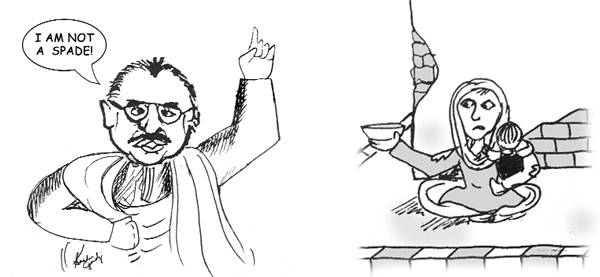
A wake-up call

Sir,
It is deeply ironic to think that, in the 21st century, over a thousand people can die like flies in the space of several days as a result of a severe heatwave. Amid the sweltering heat, with temperatures hovering around 46 degrees C and bouts of recurrent load-shedding, the state appears to be sunk in slumber, having divorced itself from the suffering of those who necessarily bear the brunt of its poor decisions.
Welcome to Pakistan. Welcome to Karachi. Welcome to a place where you will find managers and manipulators rather than leaders. Welcome to a place where you will find reverence for wealth, but not for human life. Welcome to a place where savagery exists in the garb of civility. But, most importantly, welcome to a place where the fate of the common man appears to be sealed while the state’s leaders keep wreaking havoc on the country.
Undoubtedly, climate change across the region has contributed to the escalating incidence of heatwaves in Pakistan – leaving misery and death in its wake – but what explains why our leaders are numb to this dangerous state of affairs. After all, they are in office because the public vote put them there. As the people’s representatives, they have no right to turn a blind eye now. Acute water scarcity and excessive power outages have become among the defining issues of every urban and rural area. And yet, neither the federal nor provincial governments have made any serious effort to alleviate the plight of ordinary people.
The average person on the street might remain indifferent if the Sindh chief minister should choose to doze off at a meeting, but no one is any longer content to watch people at the helm of affairs consistently fail to live up to public expectations. While people die of heat and lack of water, and power outages compound their misery, our so-called leaders rest in air-conditioned rooms, play round after round of the political blame game, and are happy to hold other leaders responsible for the tragedy or blame the sluggishness of current policies on the performance of previous governments. Does this absolve them of their responsibility to the people?
Can the government not reschedule load-shedding hours, given the intense heat and the fact that Ramzan falls at the height of summer this year? Can it not make some effort to ensure that the people of Karachi have access to clean and safe drinking water – where attempts to quench one’s thirst with contaminated water simply invite disease and death? These are important questions and demand rational answers – answers that will never justify the deaths of the heatwave victims.
Marria Qibtia Sikandar Nagra,
Lahore.
Power outages
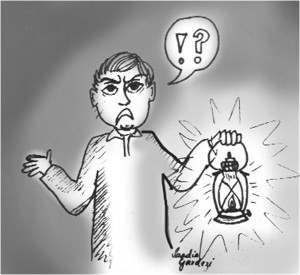
Sir,
The unprecedented heatwave in Sindh, and especially in Karachi, has left over a thousand people dead. Will our rulers – currently ensconced in their air-conditioned offices and houses – explain to the public why they have failed to protect the country from the devastating effects of unchecked pollution and environmental damage? I strongly believe that, had there been more trees and parks and open green spaces in Karachi, temperatures would not have shot up as high as 48 degrees C and claimed the valuable human lives we have lost in the last few weeks.
To make matters worse, we have suffered unprecedented levels of load-shedding – and that too, in the holy month of Ramzan. The government announced it would ensure some relief during this time, but the power outages have merely gone from bad to worse. What has the Sharif government done so far to address Pakistan’s energy crisis, given that it has been in power for over two years now? Do they remember their electoral promises of 2013? It seems not, because they have clearly failed to deliver.
While it is, of course, understandable that new power generation projects will take longer to initiate and yield any net benefit, the government has also failed to take any practical short-term measures to control power theft and reduce line losses, for example. How many power thieves have been caught and punished so far? How many MW of electricity have been conserved? None. What has the government done to reduce line losses, which reportedly account for an unacceptably high 27 percent of the electricity produced? Nothing.
I believe that this failure on the government’s part to take concerted action warrants the resignations of the federal and state ministers for electricity and water. Mr Khawaja Asif and Mr Abid Sher Ali should resign and let someone more capable do the job of leading the country out of darkness – literally. The government has assured the public that it will eliminate the need for load-shedding by the end of 2017, once the new power generation projects are completed, but it is worth pointing out that adding power generation capacity and producing more electricity without controlling line losses and power theft will be like pouring water into a leaky bucket.
Ejaz Ahmad Magoon,
Dubai.
International watchdog
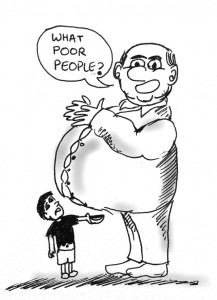
Sir,
The most important question in the ongoing human rights crisis in Myanmar concerns the role of the United Nations: an organization that claims to serve the role of international human rights watchdog. What could possibly explain their callous attitude to the plight of the Rohingyas? Or is it true what they say: that justice is only served in the interest of a hegemonic state. This begs a second question: should the UN isolate weaker states and let them resolve their issues independently?
As time passes, these questions will be raised again and again, and if the UN fails to uphold its responsibility, then the world may find itself trapped in a grim state of affairs governed by Darwin’s theory of the survival of the fittest. States that can, will race towards nuclear arms development as the only instrument capable of securing their sovereignty and integrity. This posits a picture of dark times to come. As the adage goes, states do not make bombs merely to kill pigeons. As more and more states develop a nuclear arsenal, a global catastrophe will become inevitable.
The tension in Myanmar must be defused, in which process the executive must play a proactive role with assistance from the media: the latter’s silence on the Rohingya issue has raised further questions as to whether the atrocities are state-sponsored.
Meanwhile, the OIC needs to play a larger role. Of all the Muslim nations, Turkey alone has taken the initiative to help the Rohingya Muslims. The rest have merely watched and protested. It is a matter of shame to think that Islam is the second largest religion in the world and still, silence prevails when Muslims are slaughtered. The pursuit of the worldly has blinded us to the extent that we have forgotten the value of human life.
That said, aid does not justify recourse to force. The sole purpose behind any manner of interference should be to promote peace and self-defense, not forgetting that the term “self-defense” itself is vague and was misused by the US to occupy Iraq and Afghanistan. We cannot reverse past atrocities with retaliation through force, but we can come together to help Myanmar defuse the situation.
Waleed Zafar,
Lahore.
Have a care for the homeless
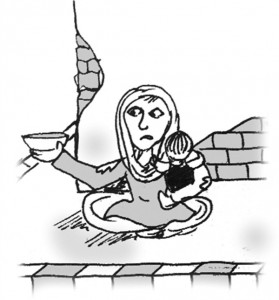
Sir,
One of Pakistan’s key problems is that of homelessness among young people. There are many reasons for this: income constraints, the cost of housing, high unemployment, mental illness, domestic violence and child abuse. In 2009, a survey in Lahore indicated that about 500,000 people were homeless (press report from Human Affairs Coordination). Among women in particular, the incidence of physical and psychological abuse can often force them to leave home – but with no place to go.
Young people from low-income households may leave to seek employment in a different city to support their families, but they often run the risk of becoming involved in illegal activities to supplement their income. Skewed patterns of urbanization have reduced the area under agricultural land while increasing property rents in urban areas. Young people who cannot afford to rent their own premises are often left to the mercy of public places that offer free meals, such as Data Darbar, Minar-e-Pakistan, Chauburji, Shahi Qilla and Bhatti Chowk.
It is imperative that local governments tackle the issue of homelessness by controlling rents and improving public service delivery.
Farah Agha,
Lahore.
Who owns Karachi?
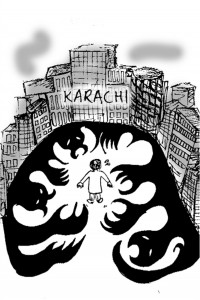
Sir,
It is Karachi’s misfortune to have offered livelihoods, shelter, fame and fortune to millions, but to be denied any real sense of ownership when the crunch comes. How else can all those who have delivered fiery speeches and enjoyed power for over two decades explain that, although water is available through hydrants, its supply through the pipeline network is restricted when it is needed most. However, if you can afford to pay a few thousand rupees, there is a thriving tanker system that will deliver water to your doorstep, provided you have the storage capacity. With over a thousand people dead of dehydration in Karachi – while politicians deliver emotional speeches – what is there left to say?
The city’s water tanker mafia, which originated in DHA in the 1980s with the connivance of a few corrupt officials, has now spread to all parts of Karachi. It has assumed the status of a tax-exempt billion-rupee (illegal) business, which has flourished under every military and civil government for almost three decades. The sad reality is that Karachi, and indeed the rest of Pakistan, have become nothing more than an economic “stopover”, where the great and good are out to make a quick dollar and where only rhetoric is liberally employed to address the basic issues of survival.
Malik T Ali,
Lahore.
BBC vs. MQM

Sir,
The recent BBC report on the MQM’s alleged involvement in anti-state activities funded and trained by RAW has opened up a new Pandora’s box. The report claims that hundreds of MQM members have been trained in northeast India during the last ten years, echoing a senior police officer’s claims in Karachi that the MQM had resorted to training target killers in India. Such accusations are not new, but it is worth noting that almost all the police officers that took part in the operation against the MQM in the 1990s have been killed.
The MQM was also accused of planning to create an independent state, “Jinnahpur”, with the help of RAW and other international players. During the recently concluded Formation Commander’s conference, the COAS openly accused RAW of supporting terrorism in Pakistan. More recently, when the Rangers raided Nine Zero, they recovered weapons of different caliber – including those from missing NATO containers – and apprehended a number of alleged high-profile target killers, land grabbers and individuals involved in extortion. The MQM has also been accused of burning down a factory in Baldia Town, Karachi, because the owners refused to pay the Rs 200 million demanded in extortion. Finally, during a raid on MQM premises in London in 2013, Scotland Yard recovered a list of explosives and weapons thought to have been used in Karachi.
These are grave accusations, but they have never been pursued to a logical end, given the political compulsions of those wanting to remain in power and having willingly allied with the MQM to this end in the provincial and federal governments. For the last decade or so, the MQM has held the post of the governor of Sindh as well as key federal and provincial ministries.
During Musharraf’s regime, the MQM was given a free hand in Karachi and urban Sindh to re- establish itself as a political entity with the idea of suppressing other political parties such as the PPP and PML (N). Efforts by the PTI to challenge the party’s clout in urban Sindh in the last general election only partially succeeded. And now, the BBC claims that an “authoritative” Pakistani source has confirmed the MQM–RAW nexus, which the party has denied as a baseless accusation and an attempt at political victimization.
Now that all fingers are pointing towards the MQM, accusing it of spreading unrest and terrorism across the commercial hub of the country in collaboration with India, there is a dire need to rise above petty politics, to call a spade a spade and to collect any documentary evidence that might support these allegations; to debate this thoroughly at in-camera sessions in parliament and take the case to court, allowing the matter to reach a logical conclusion.
If indeed the top leadership of the MQM is found to be involved in such activities, the party must be disbanded. If there are black sheep within the ranks who are collaborating with hostile intelligence agencies without the consent of the top leadership, the MQM must expel them immediately and help the law enforcement agencies bring them to task. It is high time for the party to prove itself once and for all. The federal and provincial governments should also ensure the safety and security of all officials dealing with the investigation. The case should not be left lurking, undecided, and with the potential to resurface after a short interval.
The credible nuclear deterrence established by Pakistan may have minimized the chances of conventional war, but any evidence of Indian involvement in terrorism in Pakistan must be taken up with the United Nations and other international players. There is also a need to put our own house in order: all civil and military intelligence agencies should work in conjunction to foil any foreign attempts to sponsor terrorism in Pakistan.
Muhammad Latif,
Islamabad.

